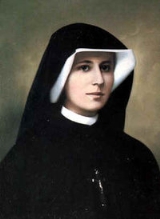
Allcard v Skinner
Encyclopedia
Allcard v Skinner 36 Ch D 145 is an English contract law
case dealing with undue influence. It is one of the leading cases in the area and in English unjust enrichment law
.
and obedience
. Three days after becoming a member, Miss Allcard made a will bequeathing all property to Miss Skinner, and passed on railway stock that she came into possession of in 1872 and 1874. She then claimed the money back after she left the sisterhood.
Cotton LJ said,
English contract law
English contract law is a body of law regulating contracts in England and Wales. With its roots in the lex mercatoria and the activism of the judiciary during the industrial revolution, it shares a heritage with countries across the Commonwealth , and the United States...
case dealing with undue influence. It is one of the leading cases in the area and in English unjust enrichment law
English unjust enrichment law
English unjust enrichment law is a developing area of law in unjust enrichment. Traditionally, work on unjust enrichment has been dealt with under the title of "restitution". Restitution is a gain-based remedy, the opposite of compensation, as a loss-based remedy...
.
Facts
Miss Allcard was introduced by the Revd Mr Nihill to Miss Skinner, a lady superior of a religious order named "Protestant Sisters of the Poor". She had to observe vows of povertyPoverty
Poverty is the lack of a certain amount of material possessions or money. Absolute poverty or destitution is inability to afford basic human needs, which commonly includes clean and fresh water, nutrition, health care, education, clothing and shelter. About 1.7 billion people are estimated to live...
and obedience
Vow of obedience
The Vow of Obedience in Catholicism concerns one of the three counsels of perfection. It forms part of the vows that Christian monks and nuns must make to enter the consecrated life, whether as a member of a religious institute living in community or as consecrated hermit...
. Three days after becoming a member, Miss Allcard made a will bequeathing all property to Miss Skinner, and passed on railway stock that she came into possession of in 1872 and 1874. She then claimed the money back after she left the sisterhood.
Judgment
Lindley LJ, held that she was unduly influenced but barred by laches from getting restitution. And in any case she would only have been able to recover as much of the gift as remained in the defendant’s hands after some of it had been spent in accordance with her wishes.Cotton LJ said,

